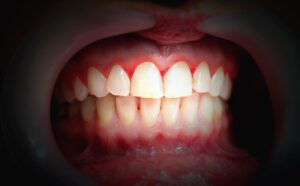Gum disease is a common type of infection in the gum tissue that can affect anyone. It develops when natural oral bacteria reach the gums and infect them. The beginning stage of the disease often comes with irritation in the gum tissue.
As the infection spreads to the teeth and jawbone, you can see significant dental damage that may result in tooth loss and other irreversible problems. You will need periodontal therapy from a dentist to eradicate gum disease. Ideally, you can practice preventative care to avoid contracting it in the first place.
While gum disease can affect dental patients of all ages and backgrounds, some people could carry risk factors that increase their likelihood of this infection. Read on to learn about three examples of dental patients who could face a greater risk of contracting gum disease.

People with Aggressive Oral Bacteria
You can keep the natural bacteria in your mouth balanced through good oral hygiene. Removing plaque can stop bacterial spread and therefore lower your risk of bacteria reaching the gums and infecting them.
But some people can develop particularly aggressive oral bacteria. While the cause of this scenario is unclear, the heightened risk of gum disease for these individuals is evident. Typical at-home oral hygiene efforts alone might not prove enough to protect the gums.
Your dentist can evaluate your oral health needs and provide individualized preventative dental care accordingly. They may suggest using special toothpaste, toothbrushes, or other hygienic products to address this type of bacteria.
Patients with Chronic Health Conditions
Your overall health can impact your likelihood of gum disease, especially your age, family history, and medications. Underlying medical conditions like heart disease, diabetes, and arthritis can also create systemic inflammation. Chronic inflammation can make you more susceptible to infections like gum disease, and then inflamed gum tissue may compromise your health further.
You could also become more prone to gum disease due to temporary health conditions like hormonal fluctuations or pregnancy. Talk to your dentist about your medical history and discover how these factors can impact your oral health.
People Exhibiting Poor Oral Habits
Over time, your lifestyle may affect your risk of gum disease. Pay attention to your oral habits as well as your overall wellness. For instance, tobacco products will contribute to gum inflammation and slow healing within the mouth, putting you in danger of infection.
Your diet can also influence your oral health. Make sure you consume balanced, nutritious foods that can keep your immune system healthy and better able to fight infections.
Use proper techniques when brushing and flossing your teeth to maximize the benefits of oral hygiene. Incorrect oral hygiene methods will mean that harmful residues remain on your smile, allowing excess bacteria to reach your gums.
Clean your smile thoroughly, and do not rush through your oral hygiene regimen. Attend professional teeth cleanings at your dentist’s office to ensure your smile stays healthy and in prime conditions to fight gum disease.
